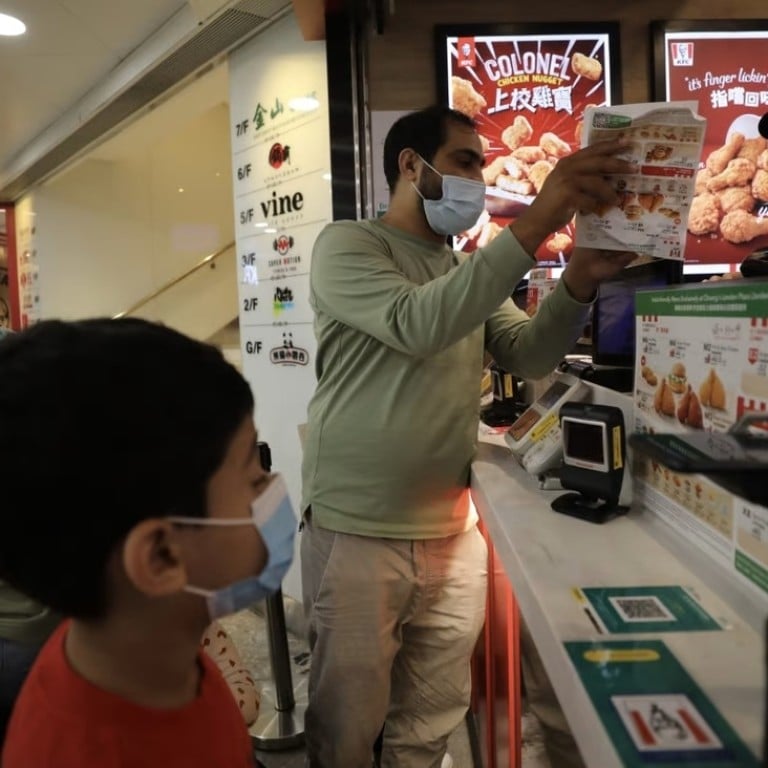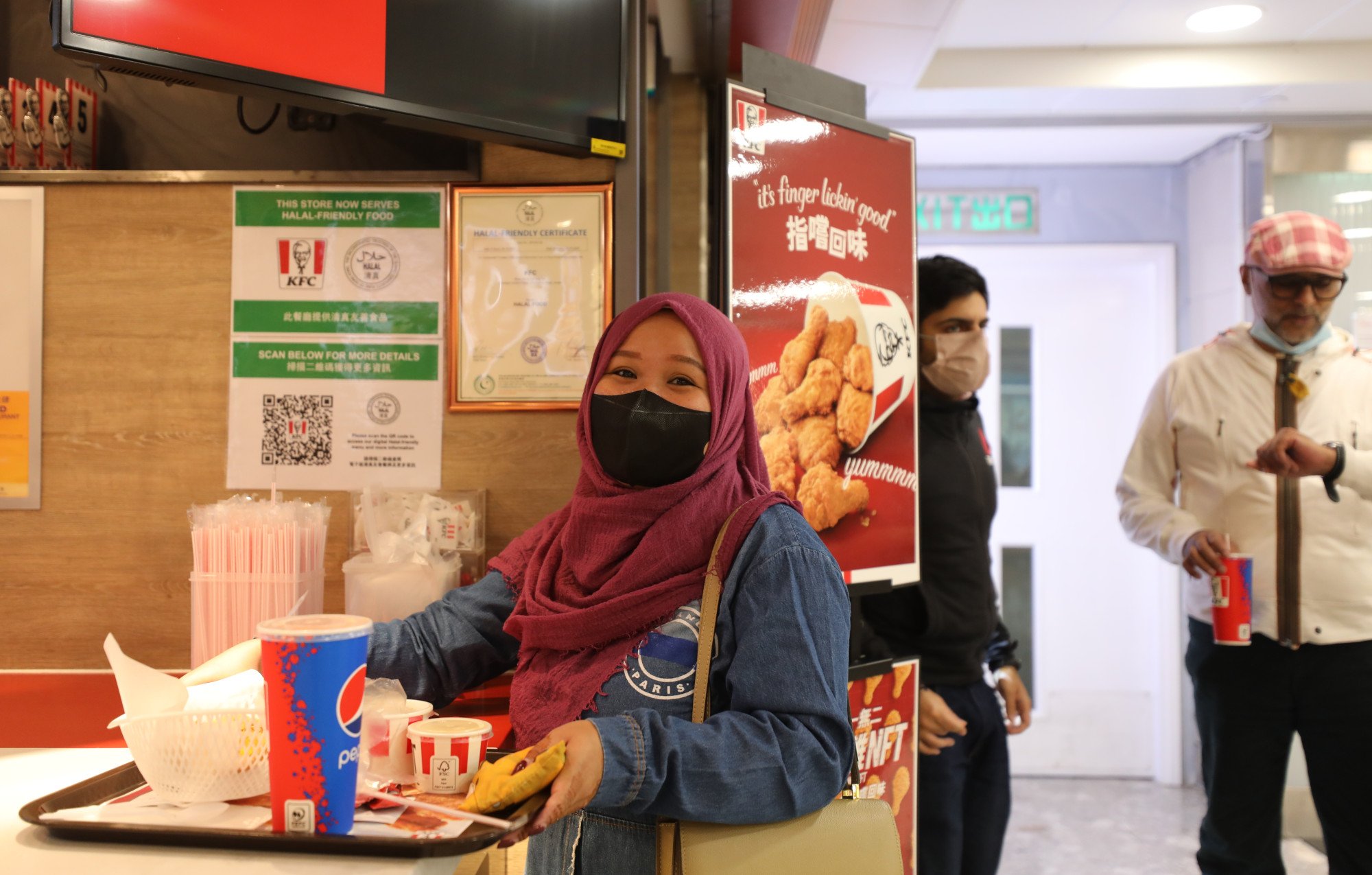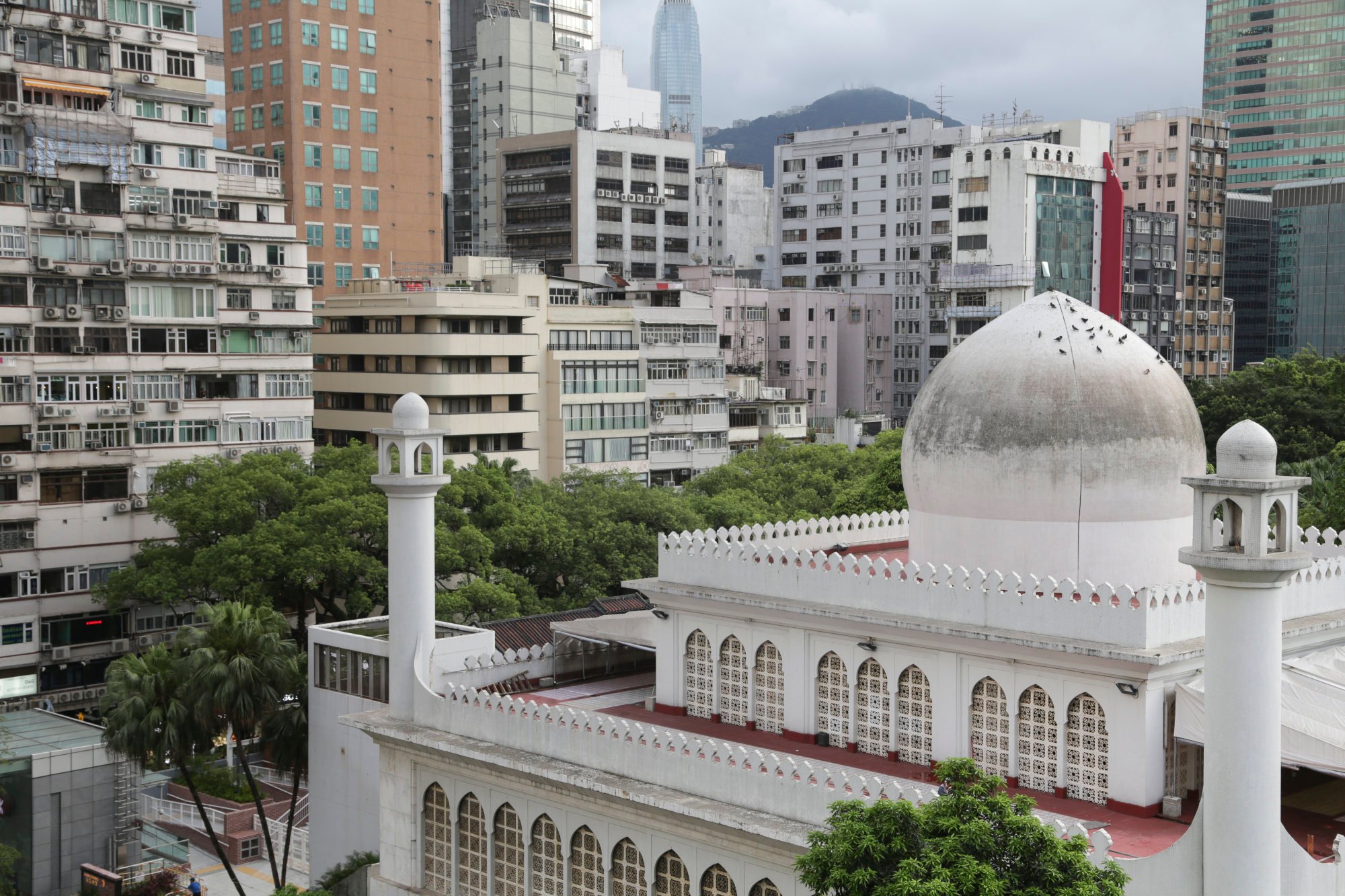
Halal in Hong Kong: Muslims cheer KFC’s move, hope more fast-food chains, restaurants will cater to community
- Choices are limited for the city’s 300,000 Muslims, as there are only 63 halal-certified restaurants
- There’s a need to raise awareness about Islamic dietary restrictions, say some in the community
It was lunchtime on Friday and the KFC restaurant just minutes from the Kowloon Mosque in Hong Kong’s Tsim Sha Tsui was packed with customers relishing their fried chicken meals.
Among them was a family of four who had come all the way from Yuen Long, because this was the fast food chain’s first halal-certified outlet in Hong Kong.
“We are very excited,” said Aslam, 50, a Muslim who had brought his wife and two children, and asked to be identified by his first name only. “Mostly, we cook at home.”
The outlet began offering halal meals last week, with KFC becoming the first fast-food chain to cater to Muslims in the city.

“We are passionate about bringing more food options to Hong Kong customers. The Halal-friendly menu is available at KFC Chuang’s London Plaza store in Jordan. This new initiative echoes our support of diversity and inclusion,” said a spokeswoman from the Jardine Restaurant Group which operates KFC and Pizza Hut.
Mufti Muhammad Arshad, Hong Kong’s chief imam and Islamic spiritual leader, welcomed the move, saying: “Any international chain which provides halal food indeed gives good news and happiness to Muslims.”
Food choices are limited for the city’s 300,000 Muslims, who make up about four per cent of the population and observe religious dietary restrictions.
Islam’s halal practices not only forbid eating pork and its by-products, but also refer to the way animals are slaughtered for their meat.
Halal certification by the Incorporated Trustees of the Islamic Community Fund of Hong Kong means an establishment is committed to sourcing and preparing food in accordance with the religion’s requirements.

But Hong Kong, known the world over as a gourmet paradise, had only 63 halal certified establishments as of February this year.
“Compared to Singapore, Thailand and other countries, we have fewer halal-certified restaurants,” Arshad said.
In Singapore, where Muslims account for 15 per cent of the population, 4,000 halal certificates were issued to food establishments last year alone.
Explaining why Hong Kong lagged behind, Associate Professor James Frankel, director of the Centre for the Study of Islamic Culture at Chinese University, said: “Muslim patronage is not enough to sustain a lot of businesses.”
How halal Chinese restaurants have taken off in Singapore
A Muslim himself, he said that to survive in the city, halal restaurants had to expand their appeal to non-Muslims too.
He regarded the KFC move as a positive development in “mainstreaming Muslim identity” in the city, but felt there was still a long way to go.
Marjan Lotfi Fard, 22, a student from Iran, hoped more multinational restaurant chains like McDonald's and Five Guys would be encouraged to do likewise.
She said that most halal restaurants in Hong Kong were found in areas such as Tsim Sha Tsui or Central.
“If you live outside those areas, it’s kind of impossible to find any,” she said, adding that there were no halal-certified restaurants in Tseung Kwan O, where she lived.
Muslims in Hong Kong: 300,000 followers, six mosques and halal dim sum
So when eating out, she looked for vegetarian restaurants or those serving seafood.
She started an Instagram page in 2020 and has about 1,000 followers who track her halal or vegetarian food recommendations.
Fellow foodie Maryam Khan, 24, who is from India and works in social media marketing, has 1,600 followers on her Instagram page about halal food.
She said she had come across restaurants that were not halal-certified but used halal suppliers for the food they served.
“After I found that out, I’ve made a habit of asking the servers if the meat is halal,” she said.
She thought it would help Muslim patrons if restaurants put up a sign or specified clearly that they used halal food supplies.

Two-thirds of the halal-certified restaurants in Hong Kong currently offer Indian or other South Asian food, and most of the others specialise in Middle Eastern cuisine. The only Chinese halal restaurant serves Cantonese style dim sum at the Osman Ramju Sadick Islamic Centre in Wan Chai.
Accountant Shereen Nawzil, 33, a Sri Lankan Muslim mother of two, lamented that she had lived in Hong Kong for nearly seven years and had not experienced its well-known street cafes.
“I would love to go to a cha chaan teng for Cantonese food, but it will be difficult as they are not halal,” she said.
For home-cooked meals, she said it was fairly easy to find halal chicken at major supermarkets and she ordered halal beef online.
Her older daughter attended an international school, and it helped that the school asked parents about their children’s food preferences and allergies.
Indonesia could issue a fatwa on medical marijuana – thanks to a mum’s love
Khan, however, recalled a bad experience from her primary school days, when she went on a field trip and was told there would be vegetarian food.
“But there was only noodles with ham,” she said. “I did tell the teacher, but I believe she didn’t understand it was a dietary requirement. She just asked me to remove the ham with a spoon and eat the noodles.”
She felt there was a need to raise awareness about halal food, and why it was essential to the Muslim community.
“If we can highlight and emphasise its importance, there is a higher chance restaurants will see the demand and cater to this niche,” she said.
Frankel agreed that most Hongkongers, who were non-Muslim, had little understanding of halal food.
“If Muslim business owners and the Muslim community could raise awareness, they could actually sell halal products beyond the Muslim community,” he said.
The government could also help, as there were benefits for harmony between communities and promoting Hong Kong as a Muslim-friendly city, he added.

